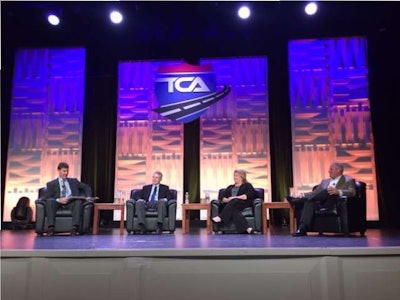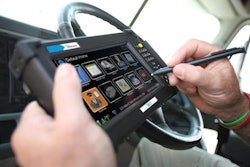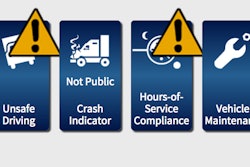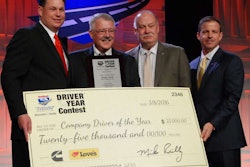 Discussing supply chain issues at the TCA’s annual meeting are, from left, moderator Todd Amen of ATBS, Paul Newbourne of Armada Supply Chain Solutions, Amy Mielke of Owens Corning and Ken Braunbach of Walmart.
Discussing supply chain issues at the TCA’s annual meeting are, from left, moderator Todd Amen of ATBS, Paul Newbourne of Armada Supply Chain Solutions, Amy Mielke of Owens Corning and Ken Braunbach of Walmart.A panel of shippers this week had a message for carriers who are reluctant to begin integrating electronic logging devices: If you can’t demonstrate much progress toward conversion, we are taking note.
Representatives of Walmart, Owens Corning and Armada Supply Chain Solutions spoke about carrier relationships at a panel on supply chain efficiencies at the Truckload Carriers Association annual meeting in Las Vegas.
Some of the panelists said carriers have encountered disruptive problems when converting to ELDs.
“We’ve not met a carrier yet who hasn’t gone to ELDs and experienced some degradation in productivity,” said Paul Newbourne, senior vice president of operations for Armada. While productivity is usually recovered in 12 to 18 months, “there is an awkward conversion period.” For fleets that have done too much fudging of logbooks, the ELD conversion can raise serious driver pay issues that have to be worked through, Newbourne noted.
The biggest challenge is with non-asset-based companies, he said. “We’ve asked how they can be sure their carriers will be compliant.”
Armada has asked for ELD plans from its carrier partners, and it has dropped some who are not making strides in that area. “Not having a plan isn’t acceptable to us,” Newbourne said.
Among carriers serving Owens Corning, “only 38 percent are 100 percent adopted” with ELDs, said Amy Mielke, senior supply chain sourcing leader, so the company expects close communications to ensure the transitions occur in a timely fashion.
Much of Walmart’s freight is hauled by large carriers who have “legacy electronic onboard recorders” and therefore are allowed a few more years under the mandate to adopt the newer technology of ELDs, said Ken Braunbach, vice president of transportation for eCommerce.
Moderator Todd Amen, CEO of owner-operator business services provider ATBS, also asked the panelists about a new push behind the updated Voluntary Guide to Good Business Relations.
The joint project between TCA and The National Industrial Transportation League emphasizes best practices among shippers, receivers, carriers and drivers.
Mielke, co-chairman of TCA’s Carrier/Shipper Relations Committee, said there was concern about how to get those four parties familiar with the practices. As a step in that direction, she said, a new video has been created to play at some truck stops that will encourage drivers to nominate shippers and receivers that are doing a good job of following the practices.
When all parties are following those guidelines, it will result in less down time and better overall working conditions for everyone in the supply chain, she said.
Since the guide’s first edition in 2000, some shippers and receivers have tried to implement it and have discovered examples of “inefficient behavior” that has given them a focus for improvement, said Newbourne. Since 2000, average detention time has dropped and there has been great use of drop-and-hook.












